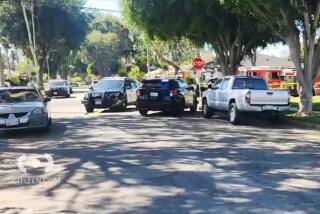In the Gutter With Tabloid TV : Videotape of Long Beach ‘Sting’ Has a Blind Spot: Truth
- Share via
Stay tuned for “Drug Wars U.S.A.” Watch undercover narcs as they kick in the doors of America’s drug lords . . . watch the dope dealers fight back . . . Right after this commercial message.
It has been called tabloid television, shows that titillate with little substance and much sensationalism. Critics scowl, but the ratings prove that this is what America likes to watch. It is presumed that there is a wide berth of believability between network television news and shows like Geraldo Rivera’s assault on Al Capone’s secret vault. It is also presumed that if “one picture is worth a thousand words,” you can’t argue with what five minutes’ worth of videotape shows. Last weekend both suppositions were proved wrong.
We cut now to Long Beach, where a news crew for NBC’s “Today Show” had secreted a camera and microphone in the car of a black man who claims that Long Beach police officers are racists. The NBC cameras were to capture proof of this on videotape.
What we television viewers eventually saw was a confrontation between the police critic and a white officer who had stopped the car. We saw the man get out of the car, agitated and complaining, and the officer responding; the audio was heavily censored, bleeping out the officer’s use of obscenities. Next the officer appeared to be pushing the man into a plate-glass store window. We heard the man screaming over silhouetted images of him apparently being manhandled by the officer.
Was this a news report or tabloid television? Did NBC violate its own policy by staging, or coming close to staging, a news event? To the average viewer, the tape proves police abuse. Or does it?
What didn’t the tape show?
Consider this incident from a police officer’s point of view:
Police make traffic stops probably hundreds of times a day throughout metropolitan Los Angeles. For most people who are stopped, it’s a disquieting experience. Most people do not jump out of their cars when stopped by police, and most certainly don’t become confrontational.
That wasn’t the case in Long Beach. The police critic had his own agenda. He got out of the car--another man stayed in the driver’s seat--walked toward the two officers and, in keeping with his script, refused to obey their commands. This man, himself a police officer (now on a stress disability leave), knew from experience exactly how far to push the officers to evoke a dramatic response. He played his role perfectly.
Most police officers in this situation will be asking themselves: Why is the guy doing this? Is he trying to divide our attention? Is he armed? What’s the driver doing? Is he going to come out firing?
While these life-threatening concerns are flashing through the officer’s mind, the responsibility of the moment is to establish control of the situation. Talking tough, offensive as it sounds to most people, sometimes has its place.
Next the videotape showed the storefront glass breaking. The police critic maintains that his face was pushed into the window, yet when he was interviewed the next day, close-up on camera, there was no evidence of injury to his face. The officer, however, cut his hand severely enough to require stitches. What, or who, shattered the window? The full videotape may--or may not--answer that question.
The police critic’s screaming voice was heard over murky pictures that supposedly showed the officer doing something to cause the man pain. Actually the shadowy images, filmed from across the dark street, only dramatically imply mistreatment. Unfortunately, NBC accepted it as factual.
No, these pictures will need a lot more than a thousand words to explain, in an investigation that will dissect exactly what happened and how the officers handled it. If misconduct is determined, it is likely that the officer will be disciplined--and probably sued by the police critic. NBC should cooperate and provide all the videotape that records the incident, not just the high-drama part that was broadcast. This is how a fair investigation is conducted--with all of the available evidence.
The unsettling thing about this event is that it gives police something else to worry about besides surviving the next “routine” traffic stop: Are they being set up for ambush by another edition of tabloid TV?
More to Read
The complete guide to home viewing
Get Screen Gab for everything about the TV shows and streaming movies everyone’s talking about.
You may occasionally receive promotional content from the Los Angeles Times.






